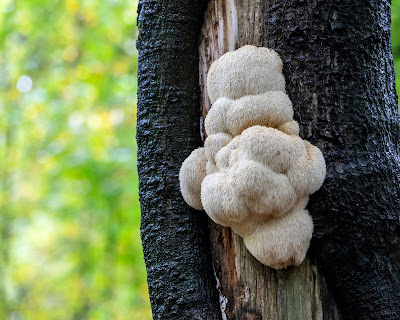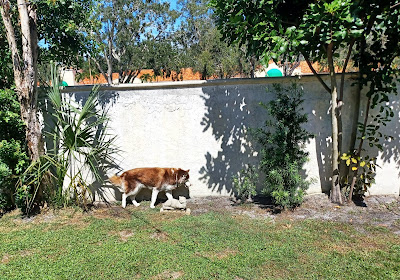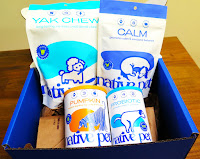I've been hearing a lot about Lion's Mane Mushrooms lately. I've been hearing that Lion's Mane mushrooms for dogs can be beneficial to dogs, just as it supposedly is for people. A couple of my friends have given Lion's Mane mushrooms to their senior dogs and feel it's made a difference. Both had senior dogs who were experiencing some decline in cognitive ability, and were also seeing some restless behavior like pacing and whining in their older dogs.
 |
| Lion's Mane Mushroom growing on a tree |
My dog Icy recently turned 14, and she has been experiencing some of these common signs of aging in dogs as well. She paces quite a lot, especially in the backyard. She often insists on going outside many times a day, but just wanders around the perimeter of the yard. She doesn't need to potty, she's not eating grass, smelling flowers, or pursuing squirrels. She just wanders around aimlessly until we finally insist she come inside. She has recently had some hearing loss as well, which probably doesn't help her agitation. There are times when my sweet dog, who was always full of life and energy, seems a little confused.
 |
| My senior dog Icy, pacing the yard |
As people age, the ability of the brain to form connections and new brain cells (neurons) is reduced. This often leads to dementia in elderly people. Studies have found that lion’s mane mushrooms are a good source of two chemicals; hericenones and erinacines, that accelerate the growth of brain cells.
This means Lion's Mane Mushrooms could positively impact the mental functioning of people with cognitive impairment. Many dog health professionals believe it can do the same for dogs.
I've been thinking about Lion's Mane Mushrooms, wondering if they could help my dog, and alleviate her restless behavior. I spoke to my Veterinarian about it and she agrees that Lion's Mane Mushrooms could be beneficial for a senior dog's cognitive ability. She said that if I wanted to try them for Icy, she would support my decision.
WHAT DOES LION'S MANE DO FOR DOGS?
I decided to do my own research on Lion's Mane Mushrooms to learn more about what they are, and to see what other Veterinary professionals and dog owners have experienced. Here's what I found out.
They are called Lion's Mane mushrooms because they are large white mushrooms whose shape resembles a lion's mane. There are a few different species of these mushrooms, but Hericium erinaceus seems to be the most popular and available species.
PIN THIS!
 |
| Lion's Mane mushrooms are large white mushrooms that resemble a lion's mane |
Native to North America, Europe, and Asia, Lion's Mane Mushrooms have both culinary (mainly in Asian countries) and medicinal uses.
Lion's Mane Mushrooms contain thiamine, riboflavin, and niacin. They are also a good source of essential minerals such as manganese, zinc, and potassium.
In a January, 2023 article in PetAge magazine, actress and animal welfare advocate Katherine Heigl was quoted as saying
"Lion's mane mushrooms are a natural source of antioxidants that play an important role in the support of a healthy immune system."
I've mentioned Katherine Heigl before in this blog, because for years I've been reading about her animal welfare advocacy and her foundation, the Jason Debus Heigl Foundation, dedicated to animal welfare. I can see the passion she has for animals. She also has a lot of connections in the pet health industry, and access to a lot of current information on dog health from Veterinary professionals.
Her foundation has saved many shelter pets that would likely not have survived. Her love for animals is evident, and I trust her resources, knowledge and integrity.
According to Only Natural Pet, a reputable provider of all natural pet products, Lion's Mane Mushrooms helps support digestive tract health, and can be especially beneficial for senior pets, as these mushrooms are known to help support cognitive function.
According to Only Natural Pet:
"Feeding your pet mushroom supplements can be a great way to help maintain the general health of all ages and breeds.... It's important never to feed raw mushrooms as they are difficult to digest...." "The safest and easiest way to introduce your pet to mushrooms is by supplementing their diet with a high-quality mushroom supplement."
Only Natural Pet sells a mushroom blend supplement that contains Lion's Mane Mushroom, as well as several other mushroom varieties.
WHAT ARE THE BENEFITS OF LION'S MANE MUSHROOMS FOR DOGS?
Most sources I found listed the main potential benefits of adding Lion's Mane Mushrooms to dogs diet as:
🦁 Lion's Mane Mushrooms can support Cognitive Health in dogs (as well as people). They can especially support cognitive abilities in older dogs.
🦁 Nervous System Support; Lion’s Mane mushrooms are believed to have neuroprotective properties, which could benefit dogs with neurological issues or dogs that are recovering from injuries
🦁 Immune System Support. Bioactive compounds found in Lion’s Mane Mushrooms could help boost dogs immune system
🦁 Digestive Health. Lion's Mane Mushrooms may have a positive impact on the digestive system. They have the potential to help with digestive issues and promote gut health
🦁 Lion's Mane Mushrooms contain compounds with potential anti-inflammatory effect, which could be helpful for dogs with inflammatory conditions or joint problems.
Overall, the consensus seems to be that Lion's Mane mushrooms show promise in many areas, but that more research is still needed to prove these benefits.
Always consult your dog’s Veterinarian before administering Lion’s Mane Mushrooms, or products that contain Lion’s Mane Mushrooms.
Your Vet can help you decide whether or not Lion's Mane Mushrooms are right for your dog, and can provide guidance on what type of Lion’s Mane Mushroom products and dosage might be a good fit for your dog. This is especially important if your dog takes any medications or has any health conditions!
If your dog's Veterinarian thinks Lion's Mane Mushrooms might benefit your dog s/he can advise on which high quality product specifically for dogs would be a good choice to try.
Lion's Mane mushrooms are gaining popularity for dog health. But more comprehensive studies are needed to confirm these benefits conclusively. As always, consult with your dog’s veterinarian before introducing any new food or supplement into your dog's diet.
I'm still on the fence about giving my dog Lion's Mane Mushrooms. I need to think about it a little more, although I am leaning towards giving them a try. If I do try them for Icy I'll let you know the results in a subsequent blog post.
Warning! There are some mushrooms that can be toxic to pets, so please be cautious if you give your dog or other pets any type of mushroom. Always consult your veterinarian first.
Have you used, or are you considering using Lion's Mane Mushrooms for your dog? Leave us a comment and let us know!
You might also enjoy these articles:










